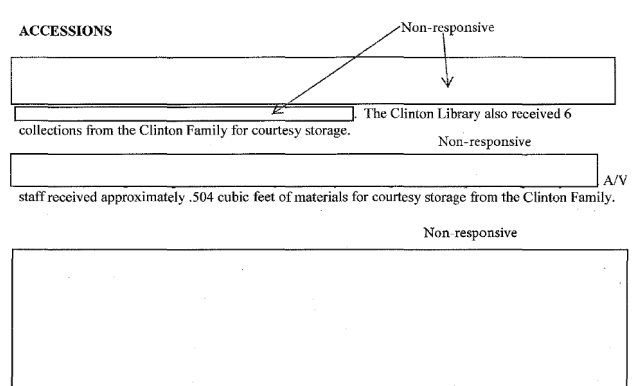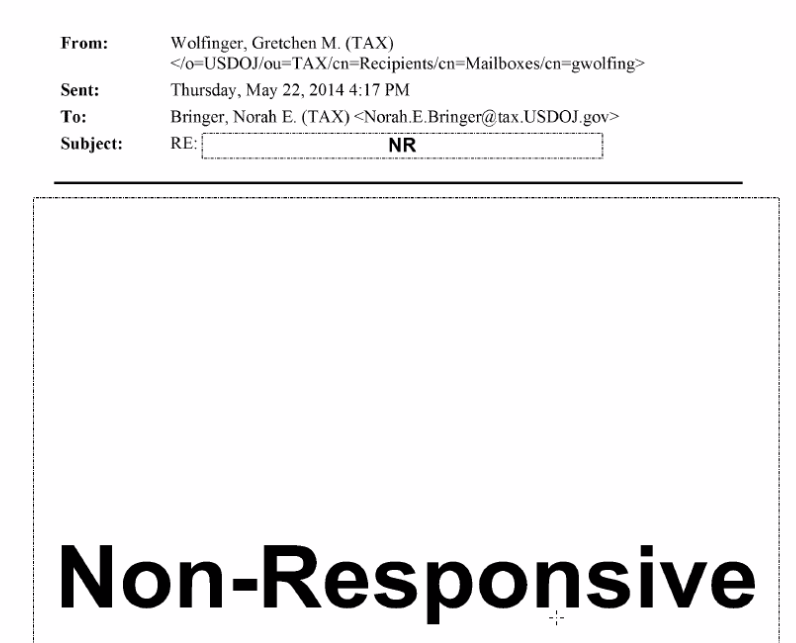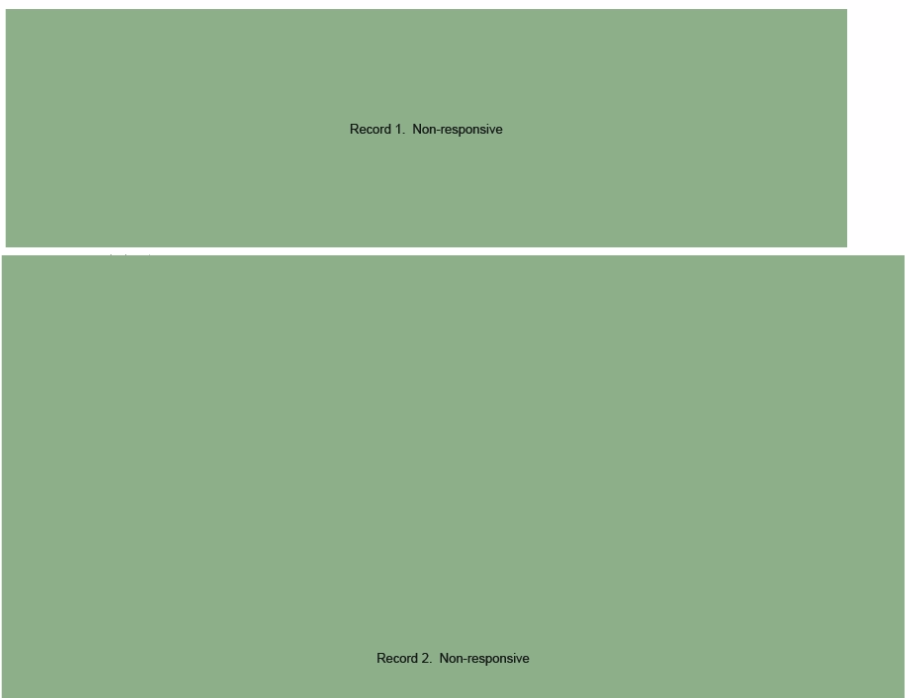The Freedom of Information Act (“FOIA”) provides access to records, not information. This may seem like a minor distinction but in the FOIA world it can mean the difference between uncovering government wrongdoing and having your request rejected because it was poorly thought out. The distinction also means that when agencies are conducting a search for responsive records they should not be able to withhold portions of information contained within responsive records, unless that information falls within one of the nine statutory exemptions. There is no “tenth exemption” that allows agencies to withhold information within responsive records just because that information is non-responsive to the request.
An examination of the statute’s terms confirms this analysis. The statutory section that empowers requesters to get documents from the government speaks in terms of “records” not “information.” FOIA requires “each agency, upon any request for records which (i) reasonably describes such records and (ii) is made in accordance with published rules . . . shall make the records promptly available to any person.”[1] The agency must search, “manually or by automated means, agency records for the purpose of locating those records which are responsive to a request.”[2]
The statutory language that allows requesters to access “records” is limited by agencies’ ability to withhold portions of those records if one of the nine statutory exemptions applies.[3] However, the agency may only redact exempt information and any “reasonably segregable portion of a record shall be provided to any person requesting such record after deletion of the portions which are exempt under this subsection.”[4] FOIA “does not authorize withholding of information or limit the availability of records to the public, except as specifically stated in this section.”[5]
Taken together, these provisions mean that requesters can access agency records and agencies may only withhold portions of those records if they fall within one of the nine statutory exemptions. They are not authorized to withhold any other information.
Agencies Attempt to Invoke a Tenth Exemption
It is common practice for agencies to only produce the portions of records that contain responsive information and assert that the remaining portions of the record in which that information is contained is “non-responsive.” For example, Cause of Action Institute sent a FOIA request to the William J. Clinton Presidential Library seeking records related to efforts by Hillary Clinton store her records at the Library. In response, the Library sent Cause of Action Institute a quarterly report that the Library filed with the National Archives and Records Administration. However, the Library withheld almost the entire 18-page report and released only small portions it deemed responsive to the request. As seen below, the Library used “non-responsive” as a “tenth exemption” to deny access to the full record:
Unfortunately, this practice is all too common.
Recent D.C. Circuit Decision Holds Agency Use of Tenth Exemption Improper
In July 2016, the D.C. Circuit decided American Immigration Lawyers Association v. Executive Office for Immigration Review and held there is “no statutory basis for redacting ostensibly non-responsive information from a record deemed responsive. . . . [O]nce the government concludes that a particular record is responsive to a disclosure request, the sole basis on which it may withhold particular information within that record is if the information falls within one of the statutory exemptions[.]”[6] This was an issue of first impression for the Circuit, which provides the leading judicial opinions on FOIA. Many district courts have permitted this agency behavior.[7]
In this case, the Executive Office for Immigration Review argued that “it was under no obligation . . . to release information that concerned matters unrelated to [the] FOIA request because the information was outside the scope of the request.”[8] The D.C. Circuit rejected this argument, reasoning that the “sole FOIA provision enabling the government to withhold responsive records is section 552(b), which sets forth the nine statutory exemptions.”[9] “The statute does not provide for withholding responsive but non-exempt records or for redacting nonexempt information within responsive records.”[10] “[O]nce an agency identifies a record it deems responsive to a FOIA request, the statute compels disclosure of the responsive record—i.e., as a unit—except insofar as the agency may redact information falling within a statutory exemption.”[11]
D.C. Circuit Sets up Next Fight over Definition of “Record”
In deciding American Immigration Lawyers Association, the D.C. Circuit realized that if the statute requires the disclosure of a record as a unit, the amount of disclosure is going to “depend[] on how one conceives of a ‘record.’”[12] The court did not directly reach that question because it used the agency’s determination that the documents containing the non-responsive redactions were the relevant “records.” However, in so ruling, the court afforded a troubling amount of deference to agencies.
The Court summarized that unlike the Privacy Act, the Presidential Records Act, and the Federal Records Act, FOIA provides no statutory definition for the term “records.” The court then looked to the agencies to provide the definition, writing: “Under FOIA, agencies instead in effect define a ‘record’ when they undertake the process of identifying records that are responsive to a request.”[13] It also afforded some authoritative deference to the Department of Justice Office of Information Policy guidance, which “sets forth a number of considerations for agencies to take into account when determining whether it is appropriate to divide [a responsive] document into discrete ‘records.’”[14] The court found “the dispositive point is that, once an agency itself identifies a particular document or collection of material—such as a chain of emails—as a responsive ‘record,’ the only information the agency may redact from that record is that falling within one of the statutory exemptions.”[15]
There is no legal basis for a court to afford deference to an agency interpretation of a term in a statute that is not organic to that agency. Arguably, it is inappropriate for a court to ever provide deference to agency interpretations.[16] However, the D.C. Circuit has held that because FOIA is not administered by one agency but instead applies across the Executive Branch, “[o]ne agency’s interpretation of FOIA is . . . no more deserving of judicial respect than the interpretation of any other agency.”[17] Further, because statute provides that judicial review in FOIA is under a de novo standard of review, courts should not be permitting agencies to decide what counts as a “record” when requiring them to release a record as a single unit.[18]
As courts, agencies, and requesters begin to internalize the implications of American Immigration Lawyers Association, the definition of a “record” is increasingly going to determine how much information is released to the public. Courts should refrain from deferring to agency attempts, should they arise, to segment records into increasingly smaller sizes.
September 21, 2016 Update: Our prediction that the D.C. Circuit decision in American Immigration Lawyers Association would set up a new fight with federal agencies over the definition of a “record” has come to pass. CoA Institute sent a FOIA request to the Department of Justice – Tax Division (“DOJ-Tax”) seeking access to a record the agency had previously produced with a series of redactions marked as non-responsive. Here is the first page of that record as originally produced.
Instead of removing the improper redactions of information and providing the record in full, as per the holding in American Immigration Lawyers Association, DOJ-Tax broke the larger record into a series of smaller records, even so far as to claim that an email header was a different record than the body of that same email. The agency then withheld all but one of those “records” as non-responsive.
Compare the full original here and the full re-produced record here.
No justification was given as to why an email chain, previously provided as a single record, had now been broken up and categorized into distinct records, why an email header containing the sender, recipient, date, and subject of the email, was now considered a record separate from the body of that same email, or why these “multiple” records, all but one of which were redacted in full because they were deemed non-responsive, were provided in response to our FOIA request.
As suggested in the original blog post, the next fight over government transparency will be the increasingly smaller segmentation of records as agencies seek to circumvent the FOIA’s presumption of openness. Requesters must be vigilant and courts should not defer to agency interpretations of the statutory term “record.”
November 8, 2016 Update: Cause of Action Institute has filed suit against the Department of Justice on this issue. The complaint is available here and the exhibits here.
February 8, 2017 Update: Cause of Action Institute has filed its Cross-Motion for Summary Judgment in this case. That filing is discussed in Defining a Record Under FOIA.
James Valvo is Counsel & Senior Policy Advisor at Cause of Action Institute. You can follow him on Twitter @JamesValvo.
[1] 5 U.S.C. § 552(a)(3)(A) (emphasis added).
[2] Id. § 552(a)(3)(D) (emphasis added).
[3] Id. § 552(b)(1)–(9).
[4] Id. § 552(b) (text following (b)(9)).
[5] Id. § 552(d).
[6] Am. Immigration Lawyers Ass’n v. Exec. Office for Immigration Review, No. 15-5201, 2016 WL 4056405, at *1 (D.C. Cir. July 29, 2016), slip op. available at http://coainst.org/2aZCRgT.
[7] See, e.g., Freedom Watch, Inc. v. Nat’l Sec. Agency, 49 F. Supp. 3d 1, 7 (D.D.C. 2014) (“The practice of redacting non-responsive materials from documents produced in response to FOIA requests has been approved by courts in this Circuit.”) (collecting cases).
[8] Am. Immigration Lawyers Ass’n, 2016 WL 4056405, at *7.
[9] Id.
[10] Id. at 8.
[11] Id.
[12] Id.
[13] Id. at 9.
[14] Id.
[15] Id.
[16] See Jack M. Beermann, End the Failed Chevron Experiment Now: How Chevron Has Failed and Why It and Should be Overruled, 42 Conn. L. Rev. 779 (2010).
[17] Tax Analysts v. IRS, 117 F.3d 607, 613 (D.C. Cir. 1997) (collecting cases).
[18] 5 U.S.C. § 552(a)(4)(B); Richard J. Pierce, What do the Studies of Judicial Review of Agency Actions Mean?, 63 Admin. L. Rev. 77, 83 (2011) (“[D]e novo review refers to an approach to judicial review in which the court does not confer any deference on the agency[.]”); Paul R. Verkuil, An Outcomes Analysis of Scope of Review Standards, 44 Wm. & Mary L. Rev. 679, 688 (2002) (“[U]nder de novo review, there should be no deference at all.”).



